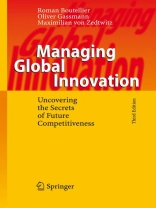If R&D and innovation in the 1990s were about more internationalization, more corporate entrepreneurship, and more information-integration, then the 2000s have been about consolidating and expanding these trends further: more globalization including the technology mavericks of China and India, more open and inbound innovation integrating external technology providers, and more web- and Intern- enabling of innovation processes by involving R&D contributors regardless of their location. The corporate R&D powerhouses of the 1980s are now mostly history. Even where they survived, they had to yield to corporate efficiency efforts and business-wide integration programs. Still, it would be unfair to belittle them in retrospect as they have found new roles in corporate R&D and innovation n- works. In fact, the very successes of centralized R&D organizations of the 1970s and 1980s made possible the revolution of globalized innovation that we have been witnessing since the 1990s. The first two editions of Managing Global Innovation, published in 1999 and 2000, were testimonials of an increasingly internationalizing world of innovation and R&D. In this third edition of Managing Global Innovation, we have retained the basic structure of two conceptual parts (I and II) and three case study parts (III, IV, V). However, we have greatly revised all chapters, including the final “Imp- cations” chapter (part VI), and incorporated new chapters and cases that illuminate and describe the recent trends in the context of the beginnings of global innovation in the 1980s and 1990s.
Jadual kandungan
Challenges and Trends.- Challenges of Organizing International Research & Development.- Extent of R&D Internationalization.- Foreign R&D in China.- Internal Drivers.- External Drivers.- Establishing Overlaying Structures.- Organizing Virtual R&D Teams.- Emerging Patterns.- The Market as a Challenge for R&D.- Technology Listening Posts.- Managing the International R-to-D Interface.- Transnational R&D Processes.- Information & Communication Technologies.- Directors of International R&D Labs.- Managing Knowledge and Human Resources.- Best-in-Class: The Pharmaceutical and Chemical Industry.- Du Pont: Gaining the Benefits of Global Networks — from the Science Base to the Market Place.- Hoffmann-La Roche: Global Differentiation between Research and Development.- Schering: Synchronized Drug Development.- Ciba: International Research Laboratories in Japan: Practical Validation of a Strategic Concept.- Kao: Localizing R&D Resources.- Best-in-Class: The Electronics, Software, and Service Industry.- Xerox: The Global Market and Technology Innovator.- Canon: R&D-Driver for Continuous Growth and Diversification.- Hewlett-Packard: Planet-Wide Patterns in the Company’s Technology Tapestry.- IBM: Using Global Networks for Virtual Development.- SAP: Global Intellectual Property Management in the Software Industry Sector.- Unisys: Localization of Software Development.- Huawei: Globalizing through Innovation.- Fujitsu: Solutions for the Ubiquitous Networking World.- Swiss Re: Global Intellectual Property Management in the Financial Services Industry.- Best-in-Class: The Electrical and Machinery Industry.- ABB: Management of Technology: Think Global, Act Local.- Daimler: Global Knowledge Sourcing and Research.- Schindler: Institutionalizing Technology Management and R&D Core Competencies.- Hitachi: Management Practices for Innovation in Global Industrial Research.- Leica Microscopy: International Transfer of R&D Activities.- MTU: Partner in International High-Tech-Cooperations.- BMW Group: Strategic Framework for Global Innovation to Enhance the Efficiency of Global R&D.- Siemens: Flying with the Dragon – Innovation in China.- Implications.- Implications for Organizing Global R&D.












